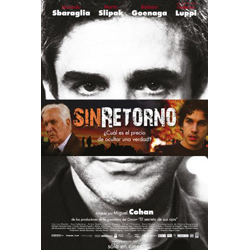Posts in this series:
Raindance 2011- Another Earth to open Raindance
- 18 World Premieres at Raindance
- Festival Preview: 10 Unmissable Raindance Films
- Another Earth
- Interview – Raindance Founder, Elliot Grove
- Skinning (Šišanje)
- Black Pond
- Fambul Tok
- Interview – Fambul Tok Producer, Libby Hoffman
- Hollow
- Amnesty (Amnistia)
- How To Start A Revolution
- Mesocafe
- By Day and By Night (De Dia y De Noche)
- The Box
- Victims
- Interview – Leaving Baghdad Director, Koutaiba Al-Janabi
- Leaving Baghdad
- Bonsai
- Face to Face
- The Ballad of Des and Mo
- Forget Paris
- No Return (Sin retorno)
- Holy Rollers
- The Wedding Party
- War Games
- Scenes of a Crime
- The Fifth Commandment (El Quinto Mandamiento)
- State of Emergency
- Top Ten: Raindance Films
Released: 2010
Director: Miguel Cohan
Starring: Leonardo Sbaraglia, Martin Slipak
An exploration of guilt and a search for justice
The strands at Raindance Film Festival in 2011 were all based on the region of origin of the movies shown, but there were other connecting themes that linked films across the official strands. One which particularly appealed to me was the exploration of justice, guilt and punishment.
No Return (Sin retorno) is an Argentinian drama following the impact on three families of a fatal hit-and-run incident. Student Matías kills a cyclist on the road and panics, leaving the scene, abandoning his car and concocting a story about a car-jacking. The victim’s father is insistent on justice being done and continually presses police and prosecutors for action. Innocent ventriloquist Federico, who had earlier collided with the cyclist, is seen as the perfect suspect and is arrested.
 Matías is guilt ridden and wants to turn himself into the authorities however his parents and lawyer persuade him to keep quiet in order to protect his future. Having seen Serbian film Skinning just a couple of weeks ago, this storyline of self-preservation and the corrupting influence that it can have really struck a chord. While the stories and situations are completely different the attitude that one life is more important and deserving of protection than another is clear in both films.
Matías is guilt ridden and wants to turn himself into the authorities however his parents and lawyer persuade him to keep quiet in order to protect his future. Having seen Serbian film Skinning just a couple of weeks ago, this storyline of self-preservation and the corrupting influence that it can have really struck a chord. While the stories and situations are completely different the attitude that one life is more important and deserving of protection than another is clear in both films.
Martin Slipak as Matías is excellent, he conveys his character’s anger, grief and desire for self-protection well. It should have been easy to dislike Matías, after all he commits a dreadful crime and leaves someone else to face the consequences, but we don’t. We feel sorry for him rather than hate him.
Leonardo Sbaraglia as Fede, the innocent man caught up in the tragedy is also very good. His confusion and pain at facing the unjust accusations are evident throughout. Federico Luppi was slightly over-the-top as the grieving father. Ironically he is the least sympathetic of the three main characters, perhaps because we know that he is blaming and chasing the wrong man.
The pacing of the film is slightly confusing. The first evening of the story takes a long time to pass but the final five years seem to be over in a flash. The film would have benefited immensely from dealing with all aspects of the storyline in a more even-handed manner.
The tension is built nicely, we wait with bated breath to see if Matías will confess the truth as we know he wants to and we are left unsure of how the judicial system will treat poor, innocent Fede.
The film is a powerful commentary on the class system and the power of the media. Matías comes from a comfortable middle-class family who can afford the best lawyers. They are unconcerned about the impact of their actions on others, as long as it doesn’t negatively impact on them. By contrast Fede is much poorer – he cannot afford decent representation and relies on loans from his father-in-law to pay household expenses. I’m sure if the financial situation had been reversed No Return would have been a very different story.
The role of the media is also important. The victim’s father is passionate in his search for justice – he speaks to the media regularly and his story features regularly on the news. The pressure from constant media coverage forces prosecutors to bring the case against Fede despite the lack of compelling evidence.
The final scene is a tense stand-off between the three men but there is no clear conclusion to the story. I enjoyed the ambiguity of the ending, it allowed me to create my own conclusion to the narrative, a conclusion I’m sure would have been different for each person in the audience.
No Return is a compelling drama about the search for justice and how it cannot always be found through the legal system.

